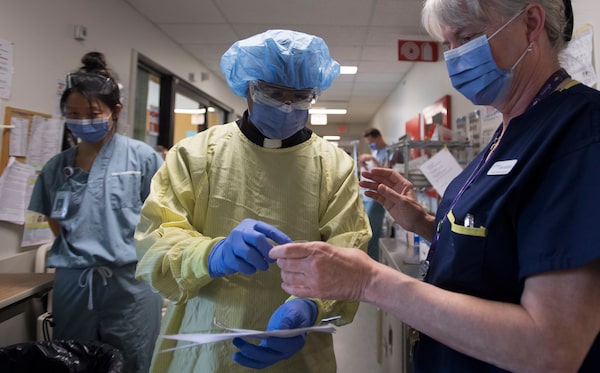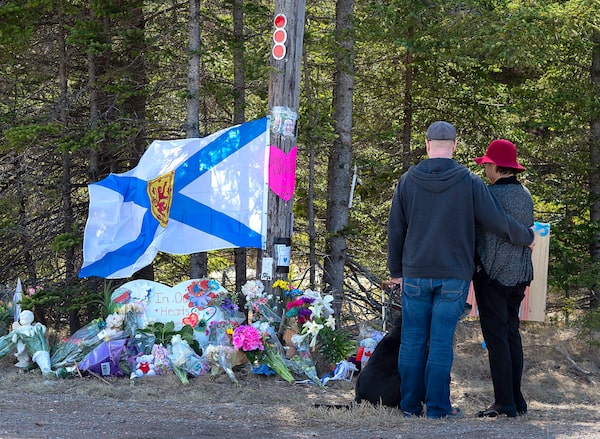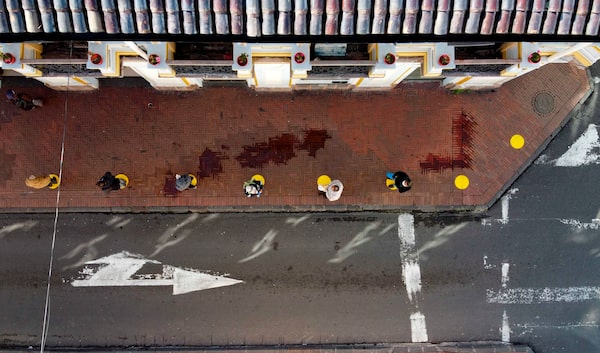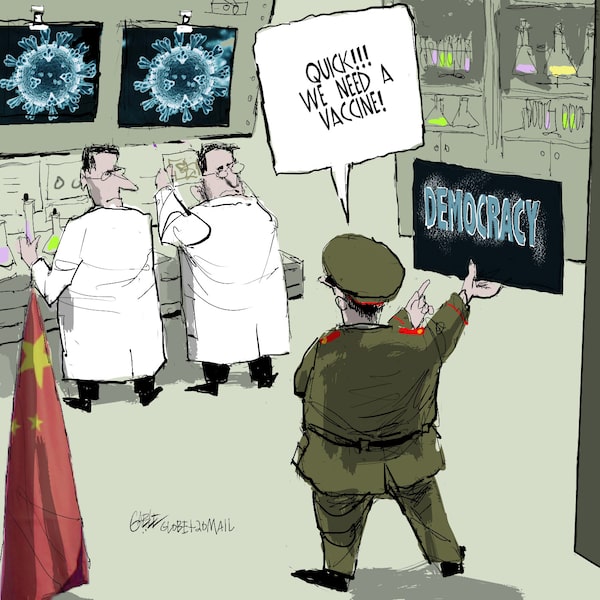Good morning,
Crucial data gaps are hurting Canada’s ability to fight the COVID-19 pandemic, leaving Canadians in the dark about who is being infected or struggling with the devastated economy.
Canada has a long-standing problem of information gaps, The Globe and Mail found in a year-long series, and that has left us vulnerable during public health crises before. But now, these blind spots could blunt the federal economic rescue effort, hide inequities in deaths from the disease and slow our emergence from self-isolation in the months ahead.

Father Victor Fernandes puts on personal protection equipment prior to visiting with a patient in the COVID-19 intensive care unit at St. Paul's hospital in downtown Vancouver on April 21, 2020.JONATHAN HAYWARD/The Canadian Press
This is the daily Morning Update newsletter. If you’re reading this on the web, or it was forwarded to you from someone else, you can sign up for Morning Update and more than 20 more Globe newsletters on our newsletter signup page.
Nova Scotia shooting: Premier Stephen McNeil is urging his mourning province to help investigators unravel questions around a gunman’s weekend rampage. A new tip line was created specifically for the killings. He acknowledged there is anger over the RCMP’s decision not to use the provincial emergency alert system during the 12-hour manhunt, but he asked people to be patient, and wait for answers.
New details are emerging about the chaos that ensued as police tried to capture the killer disguised as an RCMP officer. Audio recordings of first responders communicating on two-way radios provide a glimpse of frantic attempts to help the first victims in the village of Portapique.

A couple pays their respects at a memorial in Portapique, N.S., on April 22, 2020.Andrew Vaughan/The Canadian Press
Economy: Saskatchewan has laid out a detailed, comprehensive plan to reopen its economy, and is the first province in the country to do so. On May 4, the five phases will begin, opening non-essential medical procedures, and the reopening of provincial parks, campgrounds and golf courses.
In Quebec, Premier François Legault is preparing to lay the groundwork next week for a plan to gradually restart the province’s economy and get children back to school.
Rent: Ottawa is proposing to offer commercial rent relief, in the form of loans for landlords of small and medium-sized businesses, that would cover up to 75 per cent of tenants’ payments for three months, according to sources familiar with the negotiations.
When it comes to investment properties, small landlords across Canada might not qualify for government assistance and are scrambling to figure out how to accommodate rent reductions while making their mortgage payments.
- Catch up on Q&A with economist Mohamed El-Erian on the global economy after COVID-19
- Opinion (Andrew Coyne): We need an exit strategy for the economy
World news:
Researchers at the University of Oxford are racing to develop a vaccine for COVID-19 and plan to make a million doses of it this summer. The team has been working since January, and clinical trials involving more than 500 volunteers began yesterday. The testing is expected to take several months, but the researchers have already teamed up with manufacturers globally to produce the doses September and millions more by the end of the year. The Globe’s Paul Waldie reports.
- Ecuador’s death toll during coronavirus outbreak is among the worst in the world
- U.S. warships will be destroyed if they threaten Iran in Gulf, Revolutionary Guards chief says
- Medical experts concerned after Africa reports a 43-per-cent jump in COVID-19 cases in past week

An aerial view of people queuing outside a bank in downtown Quito, Ecuador, on April 22, 2020.RODRIGO BUENDIA/AFP/Getty Images
Got a news tip that you’d like us to look into? E-mail us at tips@globeandmail.com Need to share documents securely? Reach out via SecureDrop
ALSO ON OUR RADAR
Scheer, Tories refrain from criticizing MP accused of racist comments: People of Asian descent have faced a spike in hate crimes and slurs since the COVID-19 pandemic began in China last year and experts say the comments from an elected official give licence for the attacks to continue.
Child protection organizations seeing ‘significant uptick’ in predators: In dark-web forums, sexual predators are increasingly discussing the COVID-19 pandemic as an opportunity to exploit children online as they spend more time out of school and on the internet.
Ontario’s Serious Fraud Office investigates Bondfield: A special unit of Ontario police officers and prosecutors launched the investigation in 2019, looking into allegations of wrongdoing by a major builder of hospitals, transit stations and other public infrastructure across the province.
Parents of teen girls killed by Paul Bernardo seek to obtain his file with the parole board: The two families filed for judicial review this month after their requests for the documents under access to information legislation were denied.
MPs seek to overcome hurdle in getting WHO adviser to testify: A parliamentary committee scrutinizing the response to the pandemic is working to get key World Health Organization adviser Bruce Aylward to testify. The WHO’s legal counsel has said that Dr. Aylward cannot testify unless he receives authorization from WHO Director-General Tedros Adhanom Ghebreyesus.
MORNING MARKETS
World stocks fall on worries over EU stimulus details, coronavirus drug: Global shares fell on Friday, spurred by delays to an agreement on divisive details of the European Union’s stimulus package and doubts about progress in the development of drugs to treat COVID-19. In Europe, Britain’s FTSE 100 was down 0.93 per cent around 6 a.m. ET. Germany’s DAX and France’s CAC 40 fell 1.07 per cent and 1.03 per cent, respectively. In Asia, Japan’s Nikkei fell 0.86 per cent. Hong Kong’s Hang Seng fell 0.61 per cent. New York futures were flat. The Canadian dollar was trading at 71.05 U.S. cents.
WHAT EVERYONE’S TALKING ABOUT
Canada must protect itself from America’s response to COVID-19
Robyn Urback: “It is not implausible that Mr. Trump would retaliate in some sort of petty but potentially grave economic way – on supply lines for essential goods, for example – if Canada refuses to lift restrictions on non-essential travel if and when the President decides that time is up.”
This Ramadan, in solitude, will be more meaningful than ever
Fatima Al Fahim: “But the pandemic need not dampen Ramadan spirits. Physical distancing gives us a reminder of the true meaning of the holy month.”
The world has a big China problem now
Campbell Clark: “We don’t know precisely what happened in China in the early days of COVID-19, but we know some whistle-blowers were stifled and, for whatever reason, officials waited for days to tell the world after learning they faced a serious epidemic.”
TODAY’S EDITORIAL CARTOON

By Brian GableBrian Gable/The Globe and Mail
LIVING BETTER
What you really need is a room edit, not a reno
Especially while in isolation, you may be looking for curatorial guidance, but are keen to avoid the expense of a full interiors overhaul. “Some people would rather rip out a wall or buy a bigger house, when all it often takes is reimaging and reworking what you already have,” says Joanna Teplin, the Nashville co-founder of the Home Edit. If you want to remodel, read about how you might be able to make the change with what you already have.
MOMENT IN TIME: April 24, 2005
Snuppy, right, the first male dog cloned from adult cells by somatic nuclear cell transfer, and the male Afghan hound from which an adult skin cell was taken to clone Snuppy, are seen in this handout photo released in Seoul on Aug. 3, 2005.Seoul National University via Reuters
Snuppy – world’s first cloned dog – is born
If he were born today, Snuppy would be dubbed, in internet lingo, a very good pupper or an excellent doggo. Instead, Snuppy, the first successful clone of a dog, had to settle for merely being hailed as a breakthrough in biotechnology. A team of 45 South Korean researchers, led by stem-cell researcher Hwang Woo-suk, produced the pup using a process called somatic cell nuclear transfer with a cell from the ear of a male Afghan dog, Tai. Snuppy was named for Seoul National University (SNU) and “puppy.” While other mammals had been cloned successfully – starting with Dolly the sheep in 1996 – cloning man’s best friend proved more challenging. The achievement suggested that, given time and expertise, almost any mammal could be reproduced. Defying concerns that clones would be rife with ailments, Snuppy was generally healthy. He fathered 10 pups by artificial insemination and produced, by stem-cell clone, a litter with three surviving pups. Snuppy died of cancer, a common fate in dogs, just days after his 10th birthday in 2015. – Jessie Willms
If you’d like to receive this newsletter by e-mail every weekday morning, go here to sign up. If you have any feedback, send us a note.
 Sierra Bein
Sierra Bein